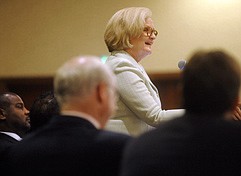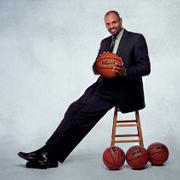Missouri and Missourians played several key roles in America's civil rights movement, U.S. Sen. Claire McCaskill noted Friday night, during her keynote address to the Jefferson City NAACP's Freedom Dinner 50th anniversary.
But that role wasn't always a step forward.
Her first example was the federal case where Dred Scott tried to gain his freedom from slavery, that was heard in St. Louis' Old Courthouse.
He lost.
"In 1857, seven of the nine justices agreed that Dred Scott should remain a slave and not be considered a citizen," McCaskill noted. "That decision enraged much of the American public, led to the election of Abraham Lincoln and hastened the start of the Civil War."
Nearly a century later, she said, two people were refused admission to the University of Missouri "because of the color of their skin."
"With the help of your organization," McCaskill told the NAACP, Lloyd Gaines "sued and the U.S. Supreme Court ruled in favor of Mr. Gaines."
The state created a law school in St. Louis for blacks, through Lincoln University.
But Gaines never attended, McCaskill noted, because "for reasons unknown, he disappeared and was never seen again."
Lucille Bluford had been admitted to MU's Journalism school "on the basis of her strong transcripts," McCaskill reminded the audience. "But, when school officials noticed her as she stood in line to register, they told her she had to go.
"She tried 11 times over four years to be admitted to the graduate journalism school. She sued, and she lost."
Years later, the University of Missouri apologized and gave Bluford an honorary degree.
And, as the second publisher of the Kansas City Call newspaper, McCaskill - a former state representative from Kansas City and, later, Jackson County's prosecutor - said Bluford "taught me a lot about speaking truth to power. She became the "conscience' of Kansas City (and) believed that solutions for the black community had to be for the whole community.
Bluford could have been bitter, McCaskill said.
But Bluford said, "You just keep fighting until you get it done."
McCaskill noted President Harry Truman's 1948 orders to integrate the military, but said it didn't really happen until the Korean War forced segregated units to work together or perish on the battlefields.
She was dismayed it took 50 years to award Bronze Stars to black soldiers who volunteered to go to the front lines in Germany during World War II, but had to give up their ranks and serve as privates when they did so.
And McCaskill remembered the work of Elliot and Muriel Battle in Columbia.
"They worked behind the scenes of social justice and modeled the social acceptance they wanted their community to adopt," she recalled - adding that the Battle family gave her "my first encounter with how many ignorant people there were in the world. I was 11 when the Battles moved down the street from us."
Muriel, who once served on LU's Board of Curators, died several years ago, and Elliot died this year, days after helping dedicate Columbia's third high school, which was named for them.
McCaskill spent her birthday last month traveling with President Barack Obama as he gave speeches in Illinois and at the University of Central Missouri in Warrensburg.
While flying on Air Force One, she said, McCaskill thought about Obama's legacy as the first black person to be president.
"His legacy is that truly anything is possible in America, for anyone," she said. "It's a legacy of strength, of intellect and good, old-fashioned courage - a legacy that's had a tremendous impact on the conversation about race in this great nation."
Fifty years from now, McCaskill said, we should be "determined to do better, to honor Dred Scott, Lloyd Gaines, Lucille Bluford, Harry Truman, (the Battles) and President Barack Obama - and thousands of others that seek that brightest sunshine of equality and justice for all."


